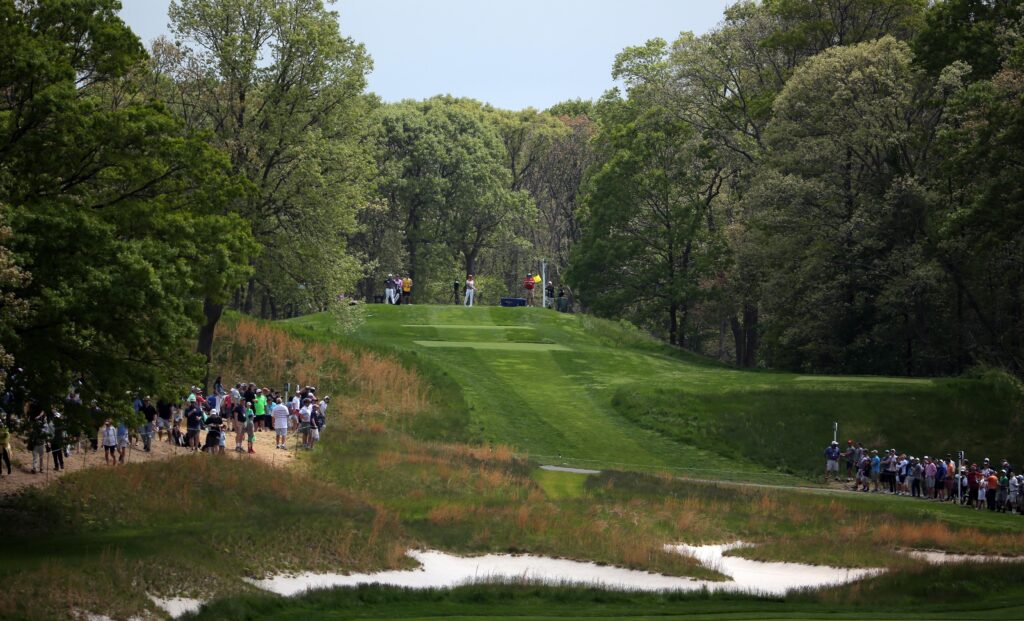The tent city bloomed in April. As a long, cold New York spring thawed into the promise of summer, the asphalt surrounding Bethpage State Park’s clubhouse transformed into something closer to a pilgrimage site.
One by one, cars arrived. Folding chairs unfolded. Coolers cracked open. And with every tailgate meal and midnight putting stroke, a community emerged. They are bound not by geography, but by a shared obsession: securing a tee time at the most mythic muni in golf.
They call it the Bethpage sleepover, and in 2025, with the Ryder Cup on the horizon, it’s reached something near fever pitch.
A People’s Tradition, Perfectly Preserved

This is no secret club. The Black Course — A.W. Tillinghast’s brutal masterpiece built for “the working man” in the heart of the Great Depression — remains as egalitarian as ever.
Nearly a century after Robert Moses and the Works Progress Administration carved Bethpage out of Long Island soil, the legacy continues every night under fluorescent parking lot lights and every morning when names are called and tee times awarded.
It’s still $80 for New Yorkers. Still, double that for out-of-towners. And still one of the most coveted public tee times in the world.
Sleep in your car. Wake with a crick in your neck and a grin on your face. Get called. Get to the starter. Play the same turf where Tiger Woods won in 2002, where Brooks Koepka dominated in 2019, and where golf’s most patriotic spectacle will return in 2025. That’s the deal — a glorious, fair, first-come-first-served deal.
Bethpage Black in Full Bloom and Full Buildout

While the greens remain fierce and the walks remain vertical, 2025’s Bethpage is growing in ways even seasoned locals haven’t seen before. Hospitality structures are now sprouting along the first and 18th holes like scaffolding for a Broadway set. Grandstands rise. Infrastructure sprawls. And the first tee box — soon to be engulfed by a Ryder Cup cauldron — awaits its own final transformation once the course closes to the public later this summer.
Rees Jones’ pre-2002 Open redesign remains intact, but subtle updates ahead of the Ryder Cup have arrived: wider fairways, sharpened bunkering (especially at 13), and — for the first time — a proper first cut. But the real change is in the air, the scale of what Bethpage is becoming. It doesn’t feel like a golf course anymore. It feels like a cathedral in progress.
The Myth and the Morning Rush

Bethpage Black is not just hard — it’s hard-earned. You earn it at midnight, three beers deep, belly laughing with strangers in the parking lot. You earn it again at 5:30 a.m. as the air shifts and the anticipation settles in. The moment is raw. Democratic. Sacred. It’s golf stripped of exclusivity and dressed in flannel and thermoses.
And the closer we inch toward the Ryder Cup, the more palpable the energy becomes. What’s already one of the game’s greatest grassroots traditions is now supercharged by the weight of the global spectacle that’s about to descend.
A Monument to Golf’s Grandest Gamble

Bethpage Black is still, at its core, a gamble — in design, in scale, in spirit. Built by government mandate for people who might never have sniffed a country club, it has somehow become one of the most revered venues in the game. And it hasn’t lost its soul.
So if you visit this summer and wander into the parking lot at sunset, you’ll find them: the tent city faithful. They’ll be laughing, eating, hoping. In a few hours, they’ll be walking toward destiny with a tee time on Tillinghast’s monster. And whether they shoot 72 or 102, they’ll carry the same thing with them home — the feeling that, for a night, they were part of something vast, legendary, and uniquely American.
Bethpage Black doesn’t sell exclusivity. It sells access. And in 2025, that grand bargain still holds — just with a lot more people lining up to shake on it.





